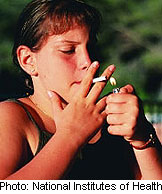
TUESDAY, July 3 (HealthDay News) — More teenagers start drinking and smoking cigarettes and marijuana in June and July than in any other months, U.S. health officials say.
During each of those summer days, more than 11,000 teens on average use alcohol for the first time, 5,000 start smoking cigarettes and 4,500 try marijuana, according to the report, which was released Tuesday by the U.S. Substance Abuse and Mental Health Services Administration.
“These months include periods when adolescents are on a break from school and have more idle time; they have fewer structured responsibilities and less adult supervision,” said Dr. H. Westley Clark, director of the administration’s Center for Substance Abuse Treatment.
The findings are based on data from the administration’s annual National Survey on Drug Use and Health for the years 2002 to 2012, which include interviews with more than 230,000 teens.
December is the only other month in which substance-start rates approach June and July levels, according to the report.
During the rest of the year, daily first-time alcohol use runs from 5,000 to 8,000 occurrences a day. Approximately 3,000 to 4,000 teens start smoking cigarettes, and about the same number try marijuana, according to the report.
More teenagers start using hallucinogens and inhalants in the summer, the researchers found. There was, however, no such increase in those starting to use cocaine or abuse prescription drugs.
Parents need to know that summertime is when their teens are more likely to start smoking, drinking and using drugs, Clark said.
“Even though summer months are about free time, it is also about greater risk,” he said. And parents need to talk to their children about these risks.
Among other programs the Substance Abuse and Mental Health Services Administration has a Smart Summer campaign that encourages parents to help prevent children from using these substances by setting boundaries, monitoring activities and being involved in their kids’ lives, Clark said.
Bruce Goldman, director of substance abuse services at Zucker Hillside Hospital in Glen Oaks, N.Y., said parents need to work with their kids to plan their time — to have some structured activity every day.
“You should have an open dialogue with your children in terms of what they’re doing and about alcohol and drugs,” he said.
“The longer you can delay adolescents from experimenting with alcohol and drugs, the better their chances of not developing problems later in life,” Goldman said. “It’s critical that parents be alert.”
More information
For more on teens and drugs, visit the American Academy of Child and Adolescent Psychiatry.

